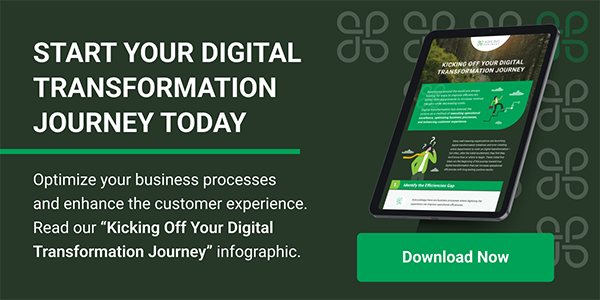Digital transformation means different things to each company and industry. In the manufacturing space, it describes applying technology to maximize revenue, reduce costs, enhance quality, and drive flexibility. These are all things the industry badly needs after the disruption of the last few years.
While the pursuit of digital transformation is ongoing and constantly evolving, there are specific approaches the manufacturing vertical can leverage to achieve these desired outcomes. In this post, we’ll look at the state of digital transformation manufacturing and provide specific use cases that exemplify its value.
Manufacturing Leaders Agree that Digital Transformation Is Vital
Manufacturing leaders realize the value of digital transformation, with 95 percent who were surveyed saying that digital transformation is essential to their success.
As you know, digital transformation is complex and requires a shift in strategy and priorities, which can deter some. Many have been hesitant to start the digital transformation journey due to fears of high costs or project complexity. However, to remain competitive, the time to start this is now, and there’s no doubt that digital transformation initiatives are driving the industry toward change.
Digital Transformation Efforts Accelerate in Manufacturing
Disruption is driving digital transformation in manufacturing. With costs increasing and supply chains still recovering, organizations know they must be more agile. As a result, manufacturers are looking to digital transformation to drive the creation of automation and data exchange, often referred to as Industry 4.0.
Automation is key to meeting manufacturing’s digital transformation objectives of revenue, costs, quality, and flexibility. It’s a dynamic, volatile industry, and manufacturers must adapt quickly. Without digital transformation, that isn’t easy. As more technology becomes a standard in manufacturing, a digital transformation strategy is critical for success.
Manufacturing Digital Transformation Use Cases
Understanding that technology is vital to your manufacturing business is a good start, but you may be wondering exactly how you can use it to meet your goals. With a path toward digital transformation, you can modernize your manufacturing specifically with technologies such as robotic process automation (RPA) and AI.
RPA in manufacturing involves using “digital robots” to execute repetitive business processes, eliminating the need for human intervention. AI, including machine learning, enhances RPA. The combination creates intelligent automation that helps you go beyond simple, mundane tasks. Intelligent automation is essential to digital transformation in manufacturing, as demonstrated by these use cases.
Integration of Legacy Systems
Legacy systems are still a large part of the manufacturing space. Decommissioning them all together isn’t always an option. Thus, they need to integrate better with more modern systems. RPA can enable easier data-sharing to bridge interoperability challenges. This helps systems be more connected and reduces reliance on human data entry.
Data Consolidation for Better Decision-Making
Consolidating data from disparate systems into a single user interface makes it more accessible to those who need it. With better data availability, people can make decisions faster. That data can support any manufacturing activity from optimizing shipping routes to improving QA methods, all of which can lead to significant operational cost savings.
Data Analytics to Support Predictive Maintenance
Another critical use case for digital transformation in manufacturing is analyzing equipment and asset performance. Advanced equipment and IoT (Internet of Things) sensors feed data into a repository. Intelligent automation structures it correctly and analyzes it. This stream of information supports predictive maintenance to reduce downtime and identifies patterns of inefficiency in operations that deserve further investigation, so your operations remain optimal.
Reducing Administrative Work
RPA can automate admin work in manufacturing, such as invoice processing,
gathering data for quote requests, generating inventory reports, and validating data. With RPA automating these tasks, workers can focus on more high-level tasks and participate in upskilling training. Your employees will actually optimize their contributions and appreciate the freedom from monotonous activities.
Key Things to Know About Digital Transformation, Automation, and Manufacturing
Although the technology is innovative and the use cases are attractive, keep in mind that success only happens when the underlying process itself is efficient. If the process has flaws, automation isn’t the duct tape to fix it. Rather, automation and digital transformation truly aim to be transformative. Sometimes you must reconfigure a process before you can amplify it with automation.
In addition, be aware that digital transformation or reaching Industry 4.0 isn’t the finish line. You’re always going to need to innovate and pivot. Digital transformation tactics like RPA and intelligent automation allow you to continue to do this indefinitely.
Finally, the best way to remain strategic and purposeful in your digital transformation journey is to have the right partners. You’re not on this venture alone. Working with a team that understands your industry, digital transformation, and intelligent automation is crucial.
To get started or to ramp up your digital transformation efforts, view our webinar, “Achieving Digital Transformation Goals with Intelligent Automation” or download the “Kicking Off Your Digital Transformation Journey” infographic.



